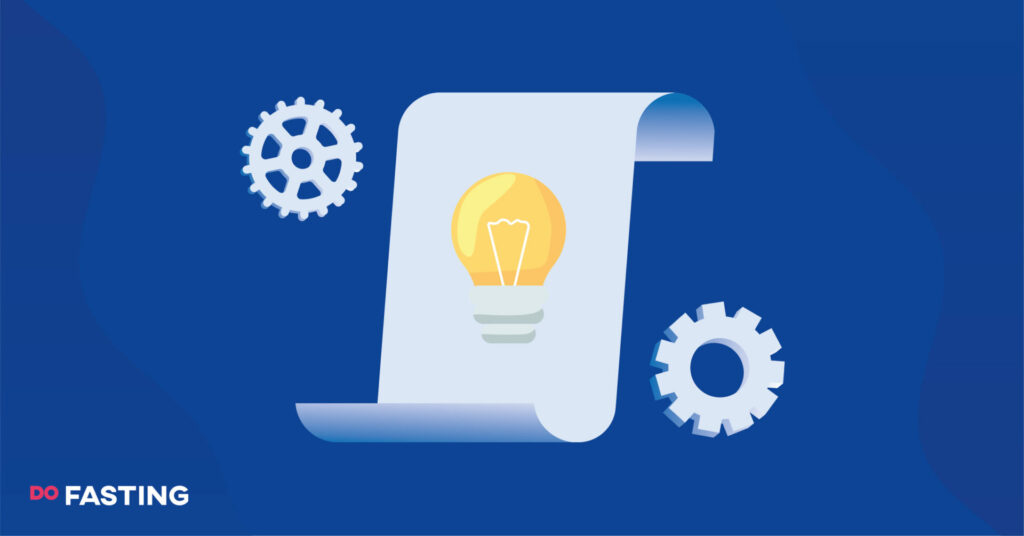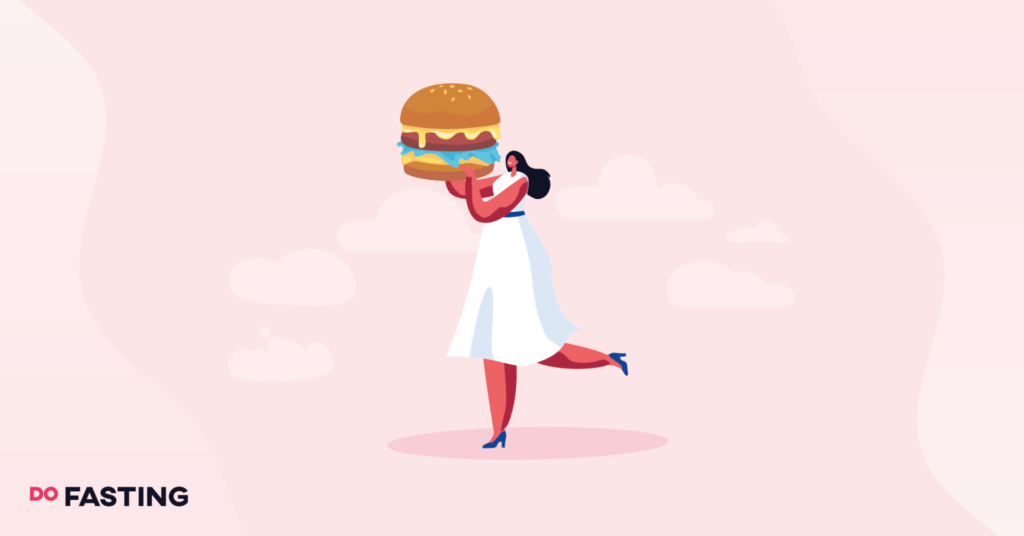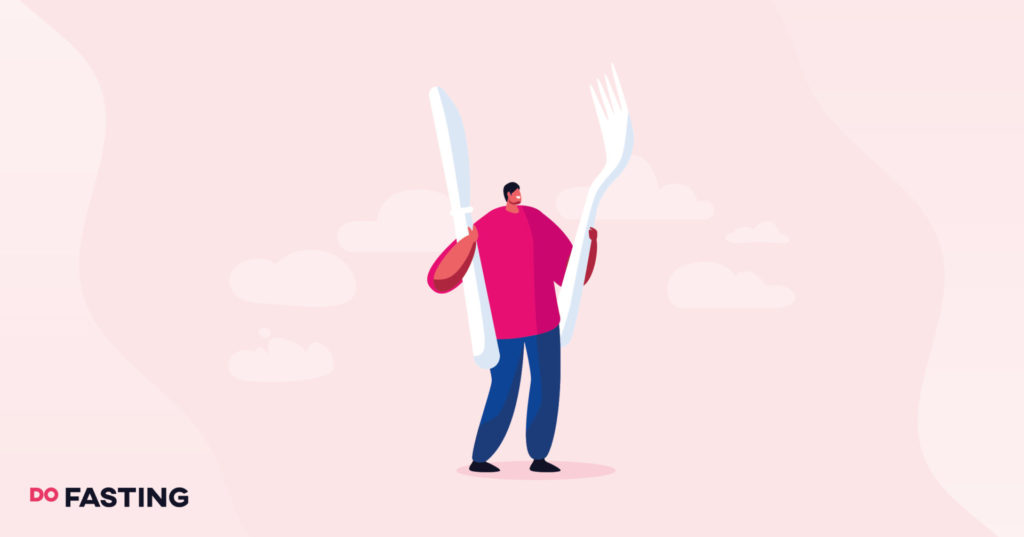Contents
1. You Will Lose Weight Faster
Eating late in the evening has long been associated with weight gain and obesity. One study found that the human body burns more calories during the late afternoon and early evening and burns fewer calories in the morning and late evening/night.
Pushing back your last meal late into the evening may also decrease your leptin levels responsible for satiety which can make you eat more than usual.
Research suggests that individuals who eat later in the evening (closer to their bedtime) tend to consume more calories than those who eat earlier. This means that if you’re a late-night eater, you may start losing weight by simply having your last meal earlier in the evening.
In other words, not eating after 7 P.M. results in weight loss only if you always eat late in the evening.
Take a
1-minute quiz
and discover how much weight you can lose with DoFasting!

2. You’ll Make Better Food Choices
It’s probably not surprising that people make poor food choices when eating late. Whether it’s a late dinner or just some late-night snacking, you’re more likely to pick something easy to make purely out of convenience. This type of food, often referred to as junk food, is usually low in nutrients and high in calories.
Do you reach for junk food when stressed? Emotional eating has been linked with night eating syndrome meaning that emotional eaters tend to eat late in the evening. Not knowing whether you’re actually hungry or just looking for food as comfort can also contribute to poor food choices.
Fatigue also plays a key role in poor food choices. More specifically, the more tired you are the more likely you are to reach for high-calorie foods.
Your food choices are detrimental to whether you gain weight or lose weight. If you stop eating at night, you will most likely eat healthier and more nutritious meals which, in turn, will make managing your weight easier.
3. You Will Sleep Better
Getting enough sleep is crucial for your body to function properly.
Numerous studies have shown that sleep deprivation, no matter how little, can promote weight gain and obesity. This is all based on two hormones that regulate hunger (ghrelin) and satiety (leptin). Ghrelin increases your appetite while leptin decreases it.
When you don’t get enough sleep, you may cause an imbalance of these appetite hormones. This imbalance may significantly increase your late-night cravings. It can also contribute to weight gain and may even lead to eating disorders and depression.
Better sleep is probably one of the first benefits that you will observe. Stop eating at least for 2-3 hours before you go to bed and see the results yourself.
4. It’s Good for Your Heart
If you stop eating at night, you may improve your heart health. Research suggests that late-night eating increases heart disease risk by 55%. While this study was done with only male participants, there is scientific evidence showing that late-night eating negatively affects the heart of both men and women.
Numerous studies have found that late eaters have an increased risk of high blood pressure and high blood sugar levels.
Furthermore, eating late at night increases the risk of developing metabolic syndrome — a cluster of conditions including high blood pressure, diabetes, and obesity.
Abstaining from food at night is not a cure-all that will prevent heart disease. However, choosing to have your last meal earlier rather than later may lower such risk.
5. Does Not Cause Stomach Problems
It probably comes as no surprise that eating right before you go to bed may cause stomach problems. Late-night meals increase gastric acid production and can put you at risk of developing gastroesophageal reflux disease (GERD) also known as chronic acid reflux.
Acid reflux may also be triggered by late-night eating. Its most common symptoms include an acidic taste in the back of your throat and heartburn. The latter is a burning sensation typically occurring in the middle of your chest, however, it can also find its way toward your throat.
If your eating and sleeping windows are close to each other, you may experience acid reflux and heartburn. Try to leave a bigger gap between your last meal and bedtime to see if it alleviates your acid reflux symptoms.
Take a
1-minute quiz
and discover how much weight you can lose with DoFasting!

Not Eating Late in the Evening and the Circadian Rhythm: Why Is It Important?
Almost every living organism has a circadian rhythm. It’s responsible for regulating your sleeping and waking cycles. These cycles are based on light and dark and repeat themselves every 24 hours. To put it simply, your circadian rhythm is the reason why you tend to feel more awake and energized during the day and drowsy at night.
In addition to sleep/wake cycles, circadian rhythms regulate a number of bodily functions including hormonal activity, body temperature, metabolism, digestion, and, of course, your eating pattern.
Eating based on your circadian rhythm can be beneficial to your health as shown in the section above.
So what happens when you eat late at night? As you just learned, your body and brain enter a resting state during night-time hours. When you eat during the sleep cycle, you throw off your circadian rhythm and disrupt your metabolism.
Most importantly, you don’t give time for your digestive system to rest and repair itself which is a process usually done throughout the night.
In order to avoid this, you don’t necessarily have to follow the “not eating after 7 P.M.” rule. Just make sure to not snack after having your dinner and leave 2-3 hours for digesting before going to bed.
Tips to Stop Eating Late at Night
It may seem impossible to break the habit of eating late at night, but it’s much simpler than it seems. Don’t treat this as a way to lose weight and gain fast results. Instead, think of it as a healthy lifestyle choice that will benefit you later down the road.
Here are some tips to help you avoid late-night eating and keep you on track.
Follow an intermittent fasting routine
A good way to stop eating at night is to have a consistent eating pattern. This is where intermittent fasting comes in.
Intermittent fasting (IF) is a time-restricted eating pattern consisting of eating and fasting periods. It’s important to note that IF is not a diet where you have to count calories. Instead, it’s a lifestyle choice that helps implement healthy habits.
How can intermittent fasting help you to stop eating at night? Simple. It does this by setting up an eating schedule where you only eat during a specific time window.
For instance, the 14:10 fasting plan consists of a 10-hour eating window and a 14-hour fasting window. So, if you set your fasting window to start at 7 P.M. it would end at 9 A.M. If you stick to this type of schedule, it becomes fairly easy to stop late-night eating.
The DoFasting app has made intermittent fasting easy. Select your IF schedule (such as 16:8 or OMAD), log your fasts, track your calorie intake, and keep yourself accountable.
Plan your meals
Consistency is key. You’ve heard that one before, I’m sure. Whether you want to drop a bad habit or form a new one, you have to do it consistently. Well, eating is no exception. In fact, eating at the same time every day greatly contributes to keeping your circadian rhythm in good shape.
Setting specific times for eating can also help you overcome the habit of eating late at night.
Aside from setting an eating schedule, you should also plan ahead on what you will eat throughout the day. Meal planning can help you eat more healthily and stop you from reaching for snacks, pre-made meals, or ordering take-out when you’re too lazy to think of something to eat.
You can check out the DoFasting app to help you plan and track your meals. DoFasting also offers a large library of healthy recipes for those days when inspiration is hard to come by.
Don’t keep trigger foods at home
Generally, trigger foods are in the junk food category. They’re usually highly sweet or salty and contain artificial flavors. This includes snacks like chips, cookies, or sodas as well as pre-made meals like pizza or burgers.
Trigger foods are highly palatable and can induce feelings of pleasure and reward in your brain. The relationship with these types of foods can almost feel like an addiction and may lead to overeating.
The nature of trigger foods makes it challenging to abstain from them when they’re at arm’s reach. This is why it’s important to identify your trigger foods and remove them from your home.
After all, when you eat late at night, you probably don’t start making a full meal. Instead, you go for a low-effort snack. By eliminating trigger foods from your home, you won’t have anything to reach for during an intense food craving.
Avoid staying up late at night
We wouldn’t survive without sleep. That is a fact. Sleep deprivation can lead you to significant weight gain and even obesity. That is also a fact.
As discussed in the previous sections, a lack of sleep may cause an imbalance of appetite hormones. This imbalance can make you feel hungry when you’re not by causing intense food cravings.
You can maintain a balance of ghrelin and leptin hormones by getting enough sleep. There really isn’t an ideal time for everyone to sleep. Everyone is different and has their own individual needs. Set a sleeping schedule and focus on consistency instead – go to sleep and wake up at the same time every day.
Take a
1-minute quiz
and discover how much weight you can lose with DoFasting!

Not Eating After 7 P.M.: Key Takeaways
Not eating late at night sounds like a no-brainer. If you constantly give in to your late-night cravings, you can upset your digestive system, disrupt your sleep, and even gain weight.
While there is no general consensus on what time you should have your last meal, everyone agrees that you shouldn’t eat more than 2-3 hours before sleep.
You can try to form this healthy habit by following an intermittent fasting schedule, planning and prepping your meals, and going to sleep early.
It’s important to remember that what you eat and how much you eat matters just as much, if not more than timing itself.
See how DoFasting will improve your life
Find out what works for you with this 60-sec quiz approved by our experts and get your personal revolutionary fasting assistant.
Start the Quiz
This is an evidence-based article that includes scientific citations. DoFasting’s professional writers and editors prepared the content, which a team of medical experts verified to be accurate.














